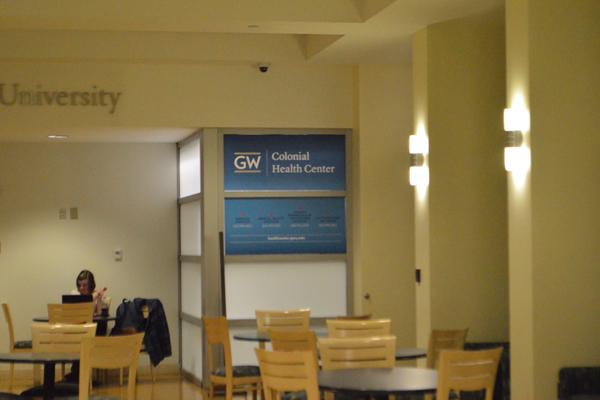Updated: Nov. 29, 2016 at 11:21 a.m.
Leaders at the Colonial Health Center are creating a student focus group to evaluate their “Be Wiser” program.
An email sent to students earlier this month called for volunteers to give feedback on a slogan for the center, but officials said those students would review the “Be Wiser” program as part of a continued evaluation process within the center. Student focus groups are the best way to tailor programming to what students actually want and need, experts said.
In an email obtained by the Hatchet to student leaders from Emily Kane, the program coordinator for the CHC, Kane said the center is planning to organize a focus group of student leaders in November to “brainstorm ideas for a new health and wellness slogan.”
“To date, our most well-known wellness slogan has been ‘Be Wiser,’ however, as the Colonial Health Center provides health and wellness programming to meet a variety of needs, we are interested in developing a new slogan that reflects our expanded focus on health and wellness,” Kane said in the email.
Alexis Janda Knott, the associate director of Health Promotion and Prevention Services, said in an email that “Be Wiser” is a program developed by the former Center for Alcohol and Drug Education before it became part of Health Promotion and Prevention Services.
She said this is not the official slogan of the Colonial Health Center or HPPS, and they are not rebranding the center. The center started to review all existing programs and initiatives when HPPS joined the CHC last year, including “Be Wiser,” to see if they fit with CHC’s “expanded vision,” she said.
“Hosting a focus group to discuss Be Wiser is a continuation of that process,” Knott said. “It is common practice to evaluate and update initiatives and programs every few years to make sure they are effective and achieving intended outcomes.”
Knott declined to comment on how staff are selecting students to participate in the focus group, other efforts they are working on to improve branding and at what stage of the process the center is in for finding a new director.
Dolores Cimini, an assistant director for prevention and program evaluation of university counseling at the University Albany, State University of New York, said every slogan must fit the individual campus.
“The important thing about slogans is that they really need to resonate with the particular campus,” she said. “So a slogan that might work on one campus may not work so well in another and vice versa.”
Cimini said at the University of Albany, staff use focus groups to ask students questions about advertisements, public service announcements and social media models and plans to see what they think about them. She said it is important to get students from all backgrounds included in this feedback, so they get different perspectives.
“We make sure we are getting a representative group of students,” Cimini said. “We actually show our students models of what we are thinking and ask ‘What are you thinking about this?’ If it seems to work, we go with what really works for the students after we ask them.”
This month, a graduate student started a new social media campaign aimed at raising awareness for men’s mental health as part of his practicum in the Colonial Health Center, and Mental Health Services started a discussion series this semester, which they have advertised on social media.
Victor Schwartz, the chief medical director for the Jed Foundation, a New York-based nonprofit organization that advocates for college mental health resources, said it is hard to measure if a slogan can be effective. But if students have participated in developing programs or wording, the messages are more likely to resonate with students, he said.
Schwartz said universities can raise awareness about their health centers and mental health services by partnering with other groups on campus.
“You have to do things to catch people’s attention, and sending long documents or complicated things typically isn’t as effective as a sound bite or a slogan,” Schwartz said. “It certainly is a way of initially connecting with people and getting them to pay attention if it is done well.”







